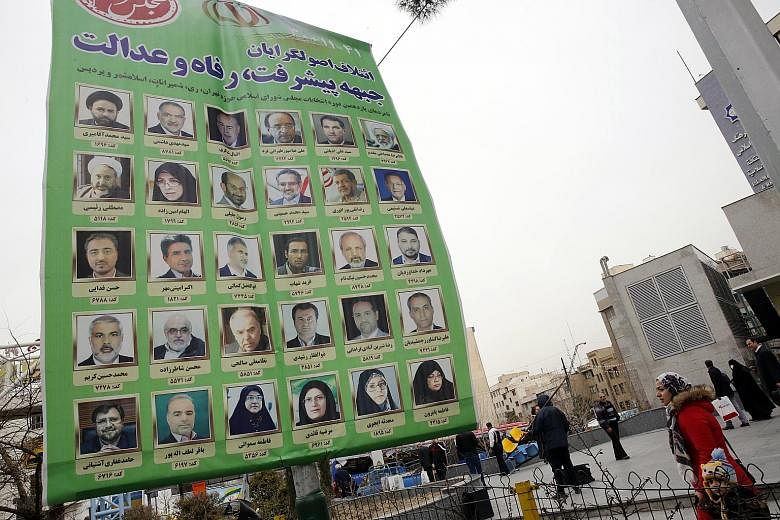DUBAI • Confrontation with the United States, economic hardship and an airline tragedy have battered Iranians' confidence in their leaders, posing a problem for the authorities in a parliamentary election this week.
As the vote on Friday nears, Iranians are in a gloomy mood, exhausted by a succession of crises that have shredded the hopes for a better life they harboured only four years ago.
That does not bode well for leaders seeking a big turnout at the ballot box: To them, crowded polling stations would signal to arch-foe Washington that Iran is unbowed by sanctions and the killing of a prominent general in a US strike.
Allies of Supreme Leader Ayatollah Ali Khamenei have ensured hardliners dominate the field, so that whatever the turnout, security hawks seeking a more confrontational approach with the US may tighten their control of the legislature.
But a meagre showing would still rattle Iran's leaders and embolden critics, who argue that the Islamic Republic needs to change domestic and foreign policy.
"My hope was that things would get a little better when I voted in the past... This time, I have no hope and I will definitely not vote," said a doctor in Teheran whose clinic is struggling to source specialised medicine. She asked not to be identified.
Four years ago, things looked very different. Iranian President Hassan Rouhani and his allies won big gains in parliamentary elections, and many hoped a nuclear deal agreed with world powers in 2015 would pull the country out of political isolation and boost the economy.
Those aspirations crumbled after US President Donald Trump quit the pact in 2018 and reimposed sanctions to further limit Iran's nuclear work, curb its ballistic missile programme and end its involvement in regional proxy wars.
"The main root of everything is the economy," said Mr Ali, a mobile phone shop employee who asked not to reveal his surname. He does not plan to vote.
"I voted for several years and it didn't make any difference," said Mr Ali, who now works longer hours as his boss keeps the store open during traditional afternoon resting periods in the hope that customers will wander in.
The authorities have been under pressure since last year, when protests over a fuel price hike were met with the bloodiest crackdown since the 1979 Islamic revolution, killing hundreds.
A US drone strike last month that killed top commander Qassem Soleimani in Iraq rallied Iranians around a common cause. But the show of support was quickly replaced by angry protests over efforts to cover up the accidental shooting down of a Ukrainian airliner that killed all 176 aboard.
"After the plane crash, the government has lost a lot of their supporters," said a Teheran resident and housewife, who does not plan to vote and asked not to be named.
Sanctions that cut Iran's crude oil exports by more than 80 per cent have already been placing a painful squeeze on living standards.
The rial has slumped, trading on the free market at about 140,000 against the dollar against its official rate of 42,000, according to foreign exchange website Bonbast.com
The currency plunge has disrupted Iran's foreign trade and boosted inflation, which the International Monetary Fund expects at 31 per cent this year.
In the eastern city of Birjand, Mr Hamed said he has no time for elections as he frets about his wedding photography business, with only one in 10 customers asking for albums after the cost of photo paper rose sixfold since 2018.
"We're focused on prices," said Mr Hamed, who declined to give his surname due to sensitivities. "We have nothing to do with politicians and politics."
Analysts expect a lower turnout than the 62 per cent in the 2016 elections, with smaller, more conservative cities where families pressure kin to vote seeing a larger showing.
But Mr Khamenei, Iran's highest authority, has tried to drum up nationalistic sentiment to secure a strong turnout.
"It's possible that someone doesn't like me, but if they like Iran they must come to the ballot box," he said in a speech.
REUTERS

